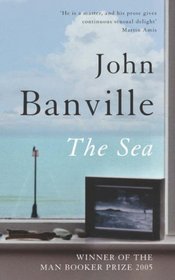Helpful Score: 13
This exquistely written and beautifully crafted book proves there's a big difference between literature and fiction! Sometimes I like to read fiction because I'm in a mood to be entertained by plots that grab my attention and characters that are quirky and fun. But more often than not I'm looking for something a little meatier - something that adds a deeper dimension because it requires putting time and thought into what I'm reading. This was such a book. There was a lot more to it than what was happening on the surface and so it meant digging a little deeper below the plot line to think about the things that motivated the characters to behave the way they did. And far from being irritated by the way John Banville uses language, I was impressed by it - in much the same way as I'm impressed when I see a beautiful work of art. Sure, there were words I'd never heard of before - but I enjoyed discovering them even though it meant keeping a dictionary handy!! Banville's writing is going to be lost on a lot of readers because it's much more than a work of fiction. But for the rest of us, it's a great example of why we love to read in the first place....it's because we love to see our language used so beautifully in the hands of a writer who has deep insights into some of the great themes that good literature has always dealt with. This is one of those books. It's a profound reflection on love,loss,regret, and the role memory plays in the grieving process. Those who love to read because they enjoy thinking about the insights to be found in books that are beautifully written will most likely love this book. Obviously not everyone reads for that reason, which is fine for them....but for the rest of us it's easy to see why Banville is considered such a fine writer.
Helpful Score: 12
I didn't care much for this book. By the time the author got to revealing the plot I didn't like the character and didn't care what happened to him. It was written in a very flowery type of language, very, very descriptive to the point of overkill. But obviously I am in the minority here because it is supposed to be an award winning book.
Helpful Score: 10
This was not my cup of tea. I don't need an exciting plot to enjoy a book. I don't mind older men looking back on their lives. In a similar vein, I loved Marilynne Robinson's Gilead, although I hated Roth's Everyman. This was closer to Everyman.
Max is a widower that is overly sensitive to smells who is grieving (I guess?) over his wife. He calls her the "c" word and admits he really didn't know her because he preferred not to know her.
Not one character in the book was likable. I guess I was lucky this was short.
Max is a widower that is overly sensitive to smells who is grieving (I guess?) over his wife. He calls her the "c" word and admits he really didn't know her because he preferred not to know her.
Not one character in the book was likable. I guess I was lucky this was short.
Helpful Score: 6
This has GLOWING reviews, from the NEW YORK TIMES, THE WASHINGTON POST, THE BOSTON GLOBE, and THE CHRISTIAN SCIENCE MONITOR, as well as having won the Man Booker Prize in Britain. It's evocative and nostalgic to me, though it didn't really ring my chimes. More my problem than its, I suspect.
Helpful Score: 5
The language of this novel is so very rich, I found myself stopped dead in my reading tracks over and over. Incredible descriptions and words. This is fine literature at its best, the kind you read for the beauty of pure reading pleasure.




